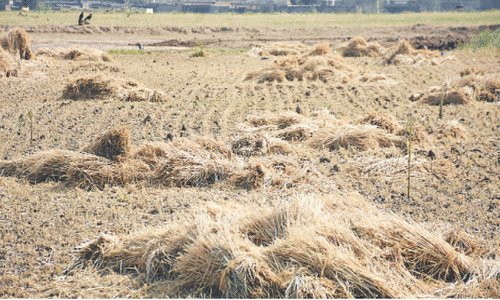KARACHI: As death toll from a deadly virus detected in China rose sharply, authorities in Pakistan issued an alert on Wednesday to “sensitise the health staff at border posts as well as in healthcare institutions ... to stay vigilant about any suspected cases coming from affected areas for early detection”.
Cases involving coronavirus have not just been reported in China but also in Thailand, Japan and South Korea. On Wednesday, the United States reported its first such case.
“It has been further reported by China’s National Health Commission that the virus can be transmitted between people and more cases are expected to emerge,” said the alert issued by the Ministry of National Health Services, Islamabad.
“In the wake of the international alert, it is hereby directed [that the] Disease Surveillance Division and the Central Health Establishment shall monitor, detect and exercise the highest level of vigilance,” it added.
In response to the alert issued by the ministry, the Field Epidemiology & Disease Surveillance Division of the National Institute of Health (NIH) issued an advisory on the outbreak, advising public health centres, private facilities and personnel monitoring movement on the borders to stay vigilant and share information about the measures taken in their respective areas of jurisdiction.
“The Chinese authorities have notified more than 200 confirmed human infections and cases have also been reported in Thailand, Japan and South Korea... The NIH is accordingly monitoring the situation and will keep all stakeholders updated,” it said.
The objective of the advisory, the NIH said, was to alert and sensitise the health staff to stay vigilant about any suspected cases coming from affected areas.
The advisory also shared information about the illness, saying the pneumonia-like illness was caused by a novel coronavirus named by CDC-US, “2019-nCoV” of the family of Coronavirus.
According to the preliminary epidemiological investigation, most victims had either worked at or were handlers and frequent visitors to the Huanan Seafood and Meat wholesale market in Wuhan, China, the advisory said.
“Recent evidences are highly suggestive that this is a zoonotic disease and primary causes of infections in humans are through contact with infected animals, and animal products (needs to be confirmed). Substantial evidences are also suggestive of human-to-human transmission as secondary infections (confirmed by Chinese authorities),” the advisory added.
The NIH advised the health centres and staff to suspect and investigate persons with certain signs, including those with severe acute respiratory infections with history of fever and/or cough and/or difficulty in breathing and with history of travel to Wuhan or any other affected area of China within last 15 days prior to the onset of symptoms.
Since no vaccine or specific treatment for 2019-nCoV infection is yet available, the advisory suggested that patient care was mainly supportive. However, it recommended some measures to be taken at all health facilities that included ensuring standard precautions including hand and respiratory hygiene followed by using personal protective equipment.
“Cover nose and mouth with a mask/tissue during examination of suspected persons,” the NIH said as suggested measures in the advisory for the hospitals. “Ensure hand hygiene after contact with respiratory secretions. Clean and disinfect frequently touched surfaces and objects, such as door knobs,” it said.
Meanwhile, an emergency operations cell was established on Wednesday in the ministry to monitor the situation round the clock.
Special Assistant to the Prime Minister on Health Dr Zafar Mirza held a meeting with senior officials to discuss preparedness and possible response to the threat of an outbreak in the country.
The ministry’s directorate dealing with the airport and port health services was instructed to maintain strict vigilance at the country’s points of entry and monitor travellers coming from the affected areas.
The directorate was asked to strengthen the health desk and quarantine arrangements at the ports of entry, Dr Mirza told Dawn.
“I am writing to all chief ministers to ensure necessary arrangements are in place in all the provinces. I am also establishing contact with National Disaster Management Authority. We will be working closely with the Embassy of China in Pakistan to deal with the situation as there are 41 incoming flights from China to Pakistan every week,” he said.
Dr Mirza added that no case involving coronavirus had been reported in Pakistan so far.
The Civil Aviation Authority (CAA ) has enhanced checks at all international airports across the country by introducing screening measures aimed to detect people with symptoms of the new and deadly disease.
A spokesman for CAA said in a press release that all passengers coming from China would be screened for the symptoms that the deadly virus causes.
Ikram Junaidi and Mohammad Asghar in Islamabad also contributed to this report
Published in Dawn, January 23rd, 2020

















































